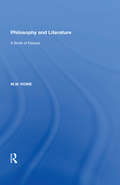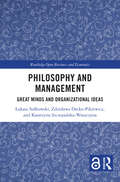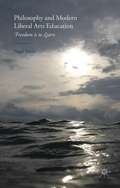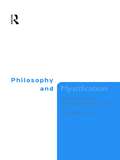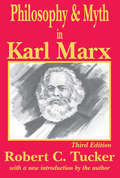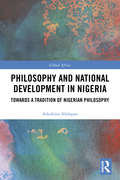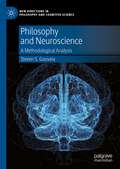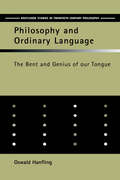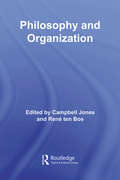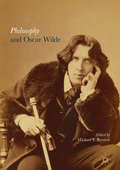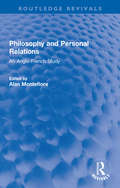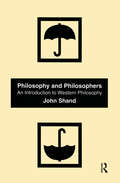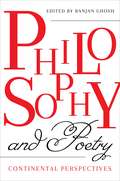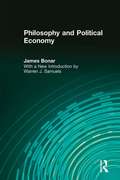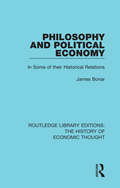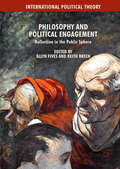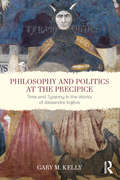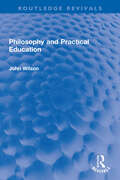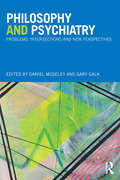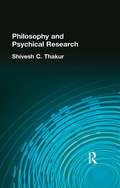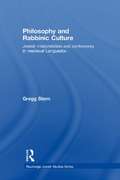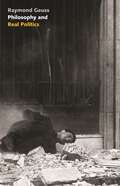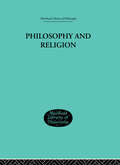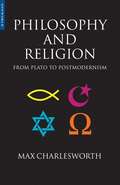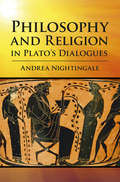- Table View
- List View
Philosophy and Literature: A Book of Essays
by M.W. RoweBringing together eight previously published essays by M. W. Rowe and a substantial new study of Larkin, this book emphasizes the profound affinities between philosophy and literature. Ranging over Plato, Shakespeare, Goethe, Arnold and Wittgenstein, the first five essays explore an anti-theoretical conception of philosophy. This sees the subject as less concerned with abstract arguments that result in theories, than with prompts intended to induce clarity of vision and psychical harmony. On this understanding, philosophy looks more like literature than logic. Conversely, the last four essays argue that literature is centrally concerned with truth and abstract thought, and that literature is therefore a more cognitive and philosophical enterprise than is commonly supposed.
Philosophy and Management: Great Minds and Organizational Ideas (Routledge Open Business and Economics)
by Łukasz Sułkowski Katarzyna Szczepańska-Woszczyna Zdzisława Dacko-PikiewiczThis book invites readers on an intellectual journey where the great minds of philosophy intersect with contemporary organizational challenges.With classical and modern philosophical thought as its backbone, Philosophy and Management: Great Minds and Organizational Ideas demonstrates that the most renowned thinkers in human history, such as Aristotle, Confucius and Nietzsche, provide timeless wisdom for navigating the complexity of today’s business environments. Combining theoretical insights with practical applications, this book presents philosophical frameworks as robust foundations for decision-making, conflict resolution and leadership strategies. It explores crucial areas such as strategic management, human resources, ethics, corporate governance and innovation, challenging readers to explore management from a reflective and ethical perspective, and shows how philosophy equips leaders to build resilient and morally responsible organizations, which are essential in an age dominated by technological advancement and rapid societal changes.The book fills a significant gap in management literature, which often lacks deep philosophical reflection on organizational practices. It draws on ancient, modern and postmodern thought, connecting these insights to current management theories, thus, making it an invaluable resource for both practitioners and scholars.The Open Access version of this book, available at http://www.taylorfrancis.com, has been made available under a Creative Commons Attribution-Non Commercial-No Derivatives (CC BY-NC-ND) 4.0 license.
Philosophy and Modern Liberal Arts Education
by Nigel TubbsThis book argues for a modern version of liberal arts education, exploring first principles within the divine comedy of educational logic. By reforming the three philosophies of metaphysics, nature and ethics upon which liberal arts education is based, Tubbs offers a profound transatlantic philosophical and educational challenge to the subject.
Philosophy and Mystification: A Reflection on Nonsense and Clarity
by Guy RobinsonPhilosophy and Mystification reflects on the nature, methods and resources of philosophic enquiry are carefully grounded in the central problems that have dogged Western philosophy in the modern era: logical necessity, machine intelligence, the relation of science and religion, determinism, scepticism and the questions of foundations and origins.
Philosophy and Myth in Karl Marx
by Robert C. TuckerIn Karl Marx's early writing (first made available many years after his death) his economic interpretation of history and his concept of communism were set in a comprehensive philosophical framework. Marx's main preoccupation at this time was with man estranged from himself in an alienated world: a subjective, almost religious theme.Taking full account of these earlier writings, Robert Tucker critiques and reinterprets Marx's thought. He shows how its origins can be located in earlier German philosophers, in particular Kant, Hegel, and Feuerbach. Reconstructing the genesis of Marxism in its founder's own mind, he clarifies Marx's mystifying contention that Marxism represented Hegelianism turned 'on its head'. He then presents a new interpretation, based on close textual analysis, of the relation between Marx's early philosophical system and the subsequent materialist conception of history as expounded in the later and best known writings of Marx and Engels. Against this background, Tucker presents Das Kapital as a work belonging to the post-Hegelian mythical development of Germany philosophy. Considering in turn the genesis of Marxism and the underlying continuity of his thought from the early writings to Das Kapital, Tucker shows the theme of alienation is central throughout.In the years since the book was first written, comments and criticism have encouraged Tucker to change his position somewhat. This is explained in a new introduction that goes beyond the interpretative enterprise of the rest of the book to assess Marx in relation to contemporary concerns: first it presents a critique of Marx's treatment of alienation and then it comments on the moot problem of the continuing relevance of his social and economic thought. On the latter point his views have matured and altered during the intervening years and he now finds the economic and social aspects of Marx's thought considerably more relevant than he did before.
Philosophy and National Development in Nigeria: Towards a Tradition of Nigerian Philosophy (Global Africa)
by Adeshina AfolayanWhat does it imply for Nigerian philosophers to conscientiously and engagingly reflect on Nigeria as a place of philosophy and as a dynamic plural context of socioeconomic, political, cultural and ethnic problems? Any answer to this question automatically constitutes the opening salvo to the reflection on the evolution of a Nigerian tradition of philosophy and philosophizing. This book represents such an initial salvo in in its attempt to hammer out the conditions for the possibility of a Nigerian tradition of philosophy by placing that endeavor in between the triadic challenges of the Nigerian political economy, the African philosophical theorizing and the global epistemological hegemony. How do these three dynamics condition the evolution and functional relevance of the philosophical enterprise in Nigeria? How have Nigerian philosophers responded to them? What is Nigerian philosophy? How can there be a "Nigerian" philosophy when there are no Nigerians? This book is also an attempt to contribute to the trajectory of philosophy education in Nigeria within the context of a postcolonial educational system and university dynamics that stultifies the role of the intellectuals in development. From Plato to Wiredu, from Bodunrin to Bourdieu, and from Heidegger and Nietzsche to Fanon, Mignolo and Santos, the book traces a trajectory of dynamics rethinking of existing paradigms and epistemological assumptions that could enable a robust evolution of a Nigerian tradition of philosophy that possesses sufficient clout to confront its historicity and its place in Nigeria’s development impasse.
Philosophy and Neuroscience: A Methodological Analysis (New Directions in Philosophy and Cognitive Science)
by Steven S. GouveiaThis book explores the methodological strategies for linking philosophy and neuroscience concerning the study of the conscious brain. The author focuses on four distinct methods for relating these two academic disciplines: isolationist, reductionist, neurophenomenological, and non-reductionist. After analyzing the pros and cons of these approaches, Steven S. Gouveia applies them to the concept of Qualia and Information to understand how the metaphilosophical assumptions of each approach influence the definitions of those specific concepts. Gouveia argues for an approach that conceives the interdisciplinarity of both philosophy and neuroscience, in a particular and sound methodology, offering empirical examples of the explanatory power of this methodology over the others. Additionally, he shows how the metaphilosophical assumptions of each methodology—usually taken by researchers implicitly and unconsciously—influence their own approach to the methodological problem.
Philosophy and Ordinary Language: The Bent and Genius of our Tongue (Routledge Studies in Twentieth-Century Philosophy #Vol. 3)
by Oswald HanflingWhat is philosophy about and what are its methods? Philosophy and Ordinary Language is a defence of the view that philosophy is largely about questions of language, which to a large extent means ordinary language. Some people argue that if philosophy is about ordinary language, then it is necessarily less deep and difficult than it is usually taken to be but Oswald Hanfling shows us that this isn't true.Hanfling, a leading expert in the development of analytic philosophy, covers a wide range of topics, including scepticism and the definition of knowledge, free will, empiricism, folk psychology, ordinary versus artificial logic, and philosophy versus science. Drawing on philosophers such as Austin, Wittgenstein, and Quine, this book explores the nature of ordinary language in philosophy.
Philosophy and Organization
by Campbell Jones René Ten BosFeaturing original contributions from some of the most exciting scholars writing at the intersection of philosophy and organization today, this accessible volume provides readers with a complete overview of this complex subject. Ground-breaking and drawing on recent efforts in management and organization studies to take philosophy seriously, it critically engages with the way that philosophy might inform organization and illuminates a range of issues, including idleness, aesthetics, singularity, transparency, power and cruelty. Exploring why philosophy matters to organization and why organization matters to philosophy, this book is essential reading for philosophy and business and management students as well as of interest to all those who seek to think seriously about the way their lives are organized.
Philosophy and Oscar Wilde
by Michael Y. BennettThis book is the first collection of essays to discuss Oscar Wilde’s love and vast knowledge of philosophy. Over the past few decades, Oscar Wilde scholars have become increasingly aware of Wilde’s love and intimate knowledge of philosophy. Wilde’s “Oxford Notebooks” and his soon-to-be-published “Notebook on Philosophy” all point to Wilde not just as an aesthete, but also as a serious philosophical thinker. The aim of this collection is not to make the statement that Wilde was a philosopher, or that his works were philosophical tracts. Rather, it provides a space to explore any and all linkages between Wilde’s works and philosophical thought. Addressing a broad spectrum of philosophical matter, from classical philology to Daoism, ethics to aestheticism, this collection enriches the literature on Wilde and philosophy alike.
Philosophy and Personal Relations: An Anglo-French Study (Routledge Revivals)
by Alan MontefioreFirst published in 1973, Philosophy and Personal Relations raises some fundamental questions like can philosophical argument modify, undermine or reinforce the terms of certain personal relationships? If so, how? This collection of studies, by a group of English-speaking philosophers focuses on these questions. The contributors discuss such topics as the teaching of moral philosophy, the notion of ‘using people’, the concept of love and the philosophical problems raised by honesty and dishonesty of personal relations. This book will provide a varied pattern of philosophical investigations which will be of interest to all those who are concerned with the issues related to the subject of personal relations and analytic philosophy at large.
Philosophy and Philosophers: An Introduction to Western Philosophy
by John ShandThis revised and updated edition of a standard work provides a clear and authoritative survey of the Western tradition in metaphysics and epistemology from the Presocratics to the present day. Aimed at the beginning student, it presents the ideas of the major philosophers and their schools of thought in a readable and engaging way, highlighting the central points in each contributor's doctrines and offering a lucid discussion of the next-level details that both fills out the general themes and encourages the reader to pursue the arguments still further through a detailed guide to further reading. Whether John Shand is discussing the slow separation of philosophy and theology in Augustine, Aquinas and Ockham, the rise of rationalism, British empiricism, German idealism or the new approaches opened up by Russell, Sartre and Wittgenstein, he combines succinct but insightful exposition with crisp critical comment. This new edition will continue to provide students with a valuable work of initial reference.
Philosophy and Poetry: Continental Perspectives
by Ranjan GhoshEver since Plato’s Socrates exiled the poets from the ideal city in The Republic, Western thought has insisted on a strict demarcation between philosophy and poetry. Yet might their long-standing quarrel hide deeper affinities? This book explores the distinctive ways in which twentieth-century and contemporary continental thinkers have engaged with poetry and its contribution to philosophical meaning making, challenging us to rethink how philosophy has been changed through its encounters with poetry.In wide-ranging reflections on thinkers such as Heidegger, Gadamer, Arendt, Lacan, Merleau-Ponty, Deleuze, Irigaray, Badiou, Kristeva, and Agamben, among others, distinguished contributors consider how different philosophers encountered the force and intensity of poetry and the negotiations that took place as they sought resolutions of the quarrel. Instead of a clash between competing worldviews, they figured the relationship between philosophy and poetry as one of productive mutuality, leading toward new modes of thinking and understanding. Spanning a range of issues with nuance and rigor, this compelling and comprehensive book opens new possibilities for philosophical poetry and the poetics of philosophy.
Philosophy and Political Economy: In Some Of Their Historical Relations (Routledge Library Editions: The History Of Economic Thought Ser.)
by James BonerThis volume is one of the most remarkable works in the history of economic thought. First published in 1893, its principal significance rests in its argument that economic theory, however technical or pragmatic, is necessarily formed by and derives its meaning from larger moral and philosophical systems and assumptions. Bonar traces the inexorable presence of this moral and philosophical element in a vast, though highly nuanced, survey of the economic aspect of major thinkers from Plato to Darwin and demonstrates how modern economic thought, in turn, grew out of one or another branch of philosophy. Bonar begins with a consideration of Plato and Aristotle, examining their conceptions of wealth, production and distribution, and civil society. Discussions of the Stoics, Epicurians, and early Christianity explore complications introduced by these bodies of thought. His analysis of the classical and medieval world is followed by an extensive treatment of the concept of natural law, from the Renaissance through the Enlightenment, describing its influence and its relation to ideas of natural rights. The book's later sections concentrate on the dominant modes of ninteenth-cen-tury thought: utilitarianism, idealism, and materialism. Bonar identifies and explores the philosophical topics on which the conduct of technical economic analysis makes assumptions: human nature and human wants, the nature and role of the state, the relation of the individual to society, the nature and origin of property, and the role of ideals in socioeconomic life. He concludes by examining the implications for economics of the theory of evolution arising from the work of Darwin and others. The continuing interest of this volume for economists, philosophers, and sociologists lies in Bonar's contention that at the heart of the relationship of philosophy to economics is the problem of order: the ongoing need to reconcile conflicts between freedom and control, continuity and change, hierarchy and equality. In his reading, the fundamental question to which philosophy and economics are both brought to bear is that of changing the structure of power and opportunity in the social economy. This is, in short, a classic in the history of economics as well as the economic element in intellectual history.
Philosophy and Political Economy: In Some of Their Historical Relations (Routledge Library Editions: The History of Economic Thought)
by James BonarThis classic text, first published in 1893, was the first attempt to present a view of the relations of philosophy and economics through the whole of their history. In tracing the history of this relationship the author begins by examining the work of the ancient philosophers and continues with the followers of the theory of natural law. He then explores the utilitarian economics and the ‘idealistic economics’. This title will be of interest to students of the history of economic thought.
Philosophy and Political Engagement
by Allyn Fives Keith BreenDophilosophers have a responsibility to their society that is distinct from theirresponsibility to it as citizens? This edited volume explores both what type ofcontribution philosophy can make and what type of reasoning is appropriate whenaddressing public matters now. These questions are posed by leadinginternational scholars working in the fields of moral and political philosophy. Each contribution also investigates the central issue of how to combinecritical, rational analysis with a commitment to politically relevant publicengagement. The contributions to this volume analyse issues raised inpractical ethics, including abortion, embryology, and assisted suicide. Theyconsider the role of ethical commitment in the philosophical analysis ofcontemporary political issues, and engage with matters of public policy such aspoverty, the arts, meaningful work, as well as the evidence base for policy. They also examine the normative legitimacy of power, including the use ofviolence.
Philosophy and Politics at the Precipice: Time and Tyranny in the Works of Alexandre Kojève
by Gary M. KellyPhilosophy and Politics at the Precipice maintains that political philosopher Alexandre Kojève (1901–68) has been both famously misunderstood and famous for being misunderstood. Kojève was famously understood by interpreters for seeing an "end of history" (an end that would display universal free democracies and even freer markets) as critical to his thought. He became famously misunderstood when interpreters, at the end of the twentieth century, placed such an end at the center of his thought. This book reads Kojève again – as a thinker of time, not its end. It presents Kojève as a philosopher and precisely as a time phenomenologist, rather than as a New Age guru. The book shows how Kojève’s time is inherently political, and indeed tyrannical, for being about his understanding of human relation. However, Kojève’s views on time and tyranny prove his undoing for making rule impossible because of what the book terms the "time-tyrant problem." Kojève’s entire political corpus is best understood as an attempt to rectify this problem. So understood, Philosophy and Politics at the Precipice provides fresh perspective on the true nature of Kojèvian irony, Kojève’s aims in the Strauss–Kojève exchange, and how Kojève at his best captures a philosophical, phenomenological time, one that marks some of the most dynamic and unique events of the twentieth century. Headlines have largely erased the notion that history has ended. Philosophy and Politics at the Precipice, on the other hand, provides the philosophical justification for arguing that the end of the last millennium was not an end and that, for his view of time, Kojève remains a thinker for the times ahead.
Philosophy and Practical Education (Routledge Revivals)
by John WilsonFirst published in 1977, Philosophy and Practical Education attempts to relate philosophy with education. It deals with themes like school, discipline, authority, curriculum, subjects, autonomy etc. to 1) discuss topics which are necessarily of direct practical concern to teachers and educators; 2) to showcase that an increase in our conceptual clarity suggests, fairly unambiguously, certain kinds of practical action; and as 3) they have not been properly dealt with in existing philosophical literature. This book is an essential read for educators, teachers, and curriculum developers.
Philosophy and Psychiatry: Problems, Intersections and New Perspectives
by Daniel D. Moseley Gary GalaThis groundbreaking volume of original essays presents fresh avenues of inquiry at the intersection of philosophy and psychiatry. Contributors draw from a variety of fields, including evolutionary psychiatry, phenomenology, biopsychosocial models, psychoanalysis, neuroscience, neuroethics, behavioral economics, and virtue theory. Philosophy and Psychiatry’s unique structure consists of two parts: in the first, philosophers write five lead essays with replies from psychiatrists. In the second part, this arrangement is reversed. The result is an interdisciplinary exchange that allows for direct discourse, and a volume at the forefront of defining an emerging discipline. Philosophy and Psychiatry will be of interest to professionals in philosophy and psychiatry, as well as mental health researchers and clinicians.
Philosophy and Psychical Research
by Shivesh C ThakurFirst published in 2002. Routledge is an imprint of Taylor & Francis, an informa company.
Philosophy and Rabbinic Culture: Jewish Interpretation and Controversy in Medieval Languedoc (Routledge Jewish Studies Series)
by Gregg SternPhilosophy and Rabbinic Culture is a study of the great, and curiously underappreciated, engagement of a Medieval European Jewish community with the philosophic tradition. This lucid description of the Languedocian Jewish community's multigenerational cultivation of - and acculturation to - scientific and philosophic teachings into Judaism fulfils a major desideratum in Jewish cultural history. In the first detailed account of this long-forgotten Jewish community and its cultural ideal, the author gives an expansive reappraisal of the role of the philosophic interpretation in rabbinic culture and medieval Judaism. Looking at how the cultural ideal of Languedocian Jewry continued to develop and flourish throughout the thirteenth and fourteenth centuries, with particular reference to the literary style and religious teaching of the great Talmudist, Menahem ha-Meiri, Stern explores issues such as Meiri’s theory of "civilized religions", including Christianity and Islam, controversy over philosophy and philosophic allegory in Languedoc and Catalonia, and the cultural significance of the medical use of astrological images. This book will be of great interest to scholars and students of Religion, of Judaism in particular, and of Philosophy, History and Medieval Europe, as well as those interested in Jewish-Christian relations.
Philosophy and Real Politics
by Raymond GeussMany contemporary political thinkers are gripped by the belief that their task is to develop an ideal theory of rights or justice for guiding and judging political actions. But in Philosophy and Real Politics, Raymond Geuss argues that philosophers should first try to understand why real political actors behave as they actually do. Far from being applied ethics, politics is a skill that allows people to survive and pursue their goals. To understand politics is to understand the powers, motives, and concepts that people have and that shape how they deal with the problems they face in their particular historical situations. Philosophy and Real Politics both outlines a historically oriented, realistic political philosophy and criticizes liberal political philosophies based on abstract conceptions of rights and justice. The book is a trenchant critique of established ways of thought and a provocative call for change.
Philosophy and Religion
by Axel HägerströmThe present volumes makes some of Hägerström’s most important writings available to English readers. At the same time, because of Hägerström’s influence, it should contribute to an increased awareness of the nature of Swedish philosophical reflection in the twentieth century. This edition first published in 2002. Routledge is an imprint of Taylor & Francis, an informa company.
Philosophy and Religion from Plato to Postmodernism: From Plato to Postmodernism
by Max CharlesworthFrom the works of the Greek philosophers to the Postmodernist theories of Jacques Derrida and Richard Rorty, this authoritative survey encompasses over two thousand years of interaction between philosophical and religious though.<P><P>Exploring the various ways in which philosophy can relate to the monotheistic religions, the author tracks five key approaches in a carefully structured and accessible manner. Following a chronological pattern, these five chapters consider both major and less well-known philosophers, and feature detailed coverage of:Plato, Aristotle and the Ancient GreeksPhilosophy and theology in St Augustine and Thomas Aquinasreason, agnosticism and the works of Kant and KierkegaardLinguistic Analysis, religion and WittgensteinPostmodernism and religion: Heidegger, Derrida and RortyAccompanied by full reference notes, this thorough and up to date text is essential reading for all students and thinkers who wish to know more about philosophy,religion and the diverse ways in which these two fields have come together over the centures.
Philosophy and Religion in Plato's Dialogues
by Andrea NightingaleIn ancient Greece, philosophers developed new and dazzling ideas about divinity, drawing on the deep well of poetry, myth, and religious practices even as they set out to construct new theological ideas. Andrea Nightingale argues that Plato shared in this culture and appropriates specific Greek religious discourses and practices to present his metaphysical philosophy. In particular, he uses the Greek conception of divine epiphany - a god appearing to humans - to claim that the Forms manifest their divinity epiphanically to the philosopher, with the result that the human soul becomes divine by contemplating these Forms and the cosmos. Nightingale also offers a detailed discussion of the Eleusinian Mysteries and the Orphic Mysteries and shows how these mystery religions influenced Plato's thinking. This book offers a robust challenge to the idea that Plato is a secular thinker.
